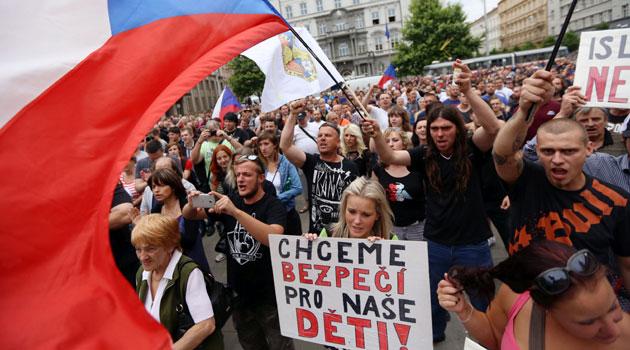National Security Audit finds Czech Republic has no concept for preventing extremism and just relies on repression

The Czech Republic does not have a clear, functioning concept for preventing extremism. The state relies only on repression and is not able to sufficiently justify its use of such tactics to the public.
Those are the findings of the National Security Audit, which was published by the Office of the Government today. According to that document, it is not clear in the Czech Republic who is supposed to initiate the prevention of such extremism, towards whom such prevention is supposed to be targeted, or what the message should be.
The production of the audit was commissioned by Czech Prime Minister Bohuslav Sobotka (Czech Social Democratic Party – ČSSD) in relation to last year’s terrorist attacks in Europe. “The Czech Republic has a large number of experts on extremism, but it has almost no experts on the prevention of extremism and related phenomena,” the report states, according to which the state administration’s strategy for eliminating extremism remains at the level of repression only.
While repression is effective, it must be applied in time. “Sometimes it’s enough for the police to clearly declare they will not tolerate a certain type of illegal behavior,” the document states.
Another problem of the current preventive measures that do exist is that they are not precisely targeted and are oriented toward society as a whole. According to the report, this is because activists or bureaucrats without the relevant education and experience contribute to creating them.
Most projects, moreover, target right-wing extremism and according to the audit there are “practically no” campaigns against left-wing extremism. The right-wing extremist scene, according to the audit, is undergoing a dynamic development and does not have an integrated political opinion.
The scene does not have a uniform ideology but agrees on hatred of minorities. “Currently animosity toward Romani people has been absolutely pushed into the background and replaced by animosity toward immigrants and Muslims,” the report says.
The state has not managed to flexibly respond to citizens’ concerns connected with immigrants, according to the report. The left-wing extremist scene is comprised, according to the audit, primarily of anarchists who are not, however, united in advocating for their aims.
The left-wing movement is comprised of many individual groups that are unwilling to compromise with each other. In public, therefore, they present themselves in areas about which there is no conflict, for example, aid to the homeless and refugees, or environmental protection.
The radical segment of the anarchists considers the use of violence legitimate, according to the report. In the Czech Republic it is allegedly common for these people to assault their ideological opponents or to engage in property destruction.
Both left-wing and right-wing extremists are inspired by organizations abroad with whom they have close ties. One solution, according to the audit, would be to provide the public with information about the extremist scene, the victims of the extremists, and other phenomena related to extremism.
Measures against extremists should be explained by the administration to the public and justified. According to the audit it is also necessary to train new experts on extremism and offer alternative solutions to the problems to which extremists draw attention.
